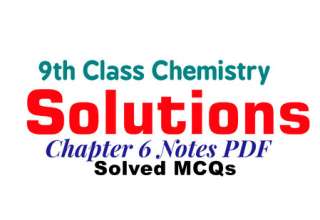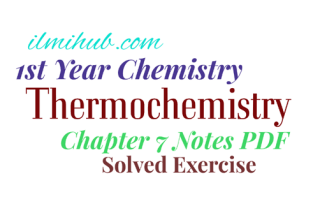In this post, I am sharing FSC 1st Year Chemistry Chapter 9 Important MCQs PDF Notes for the students of FSC Part 1. Name of 11th Chemistry Chapter 9 isSolutions. So the students can download Solutions Chapter Solved MCQs in PDF format from here. This file contains only 07 pages. These Chemistry Notes are for all the boards working under Punjab Board like Gujranwala Board, Lahore Board, Faisalabad Board, Multan Board, Rawalpindi Board, Sargodha Board, DG Kahn Board, and Sahiwal Board. Here are complete 1st Year Chemistry Notes.
11th Class Chemistry Chapter 9 Important MCQ’s PDF Download
Molarity of pure water is.
a) 1
b) 18
c) 55.5
d) 6
Opal is an example of solution:
a) liquid in solid
b) solid in liquid
c) solid in solid
d) all are possible
which of the following is not an example of liquid in solid;
a) butter
b) paint
c) cheese
d) mercury in silver
Sucrose is an organic compound, it readily dissolved in:
a) benzene
b) water
c) kerosene oil
d) both a and c
which of the following are not practically immiscible liquids
a) water and benzene
b) water and carbon disulphide
c) water and triethylamine
d) all are immiscible
A sample of matter with uniform properties and fixed composition is called
a) mixture
b) phase
c) colloidal
d) solution
which of the following terms of concentration is independent of temperature;
a) molality
b) mole fraction
c) molarity
d) both a and b
An azeotropic mixture of two liquid boil at low temperature then either of them when;
a) it is saturated
b) show positive deviation
c) show negative deviation
d) it is metastable
The molal boiling point constant is the ration of the elevation in boiling point to;
a) malarity
b) molality
c) mole fraction of the solvent
d) mole fraction of the solute
The vapour pressure of a solvent is 20 torr and of the solution is 18 torr. What will be the mole fraction of the solute;
a) 1
b) 0.1
c) 0.9
d) zero
the vapoour pressure of the solution containing non-volatile siolute is less than that of a pure solvent due to;
a) decrease in surface area
b) increase in attractions
c) increase in mass of solution
d) both a and b
which of the following pair give a non ideal solution;
a) benzene & toluene
b) chlorobenzene & bromobenzene
c) benzene and ether
d) all of these are ideal
Relevant Notes
- FSC 1st Year Chemistry Chapter 1 Additional MCQs PDF
- FSC 1st Year Chemistry Chapter 2 Additional MCQs PDF
- 11th Chemistry Chapter 3 Additional MCQs PDF
- FSC Part 1 Chemistry Chapter 4 Additional MCQs PDF
- FSC Part 1 Chemistry Chapter 5 Additional MCQs PDF
- 1st Year Chemistry Chapter 6 Additional MCQs PDF
- FSC 1st Year Chemistry Chapter 8 Additional MCQs





